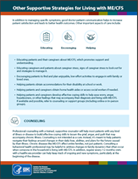Additional Strategies for Living with ME/CFS
Other important aspects of care are:
- Educating patients and their caregivers about ME/CFS. This can promote support and understanding.
- Encouraging patients to find enjoyable, low-effort activities to engage in with family or loved ones.
- Helping patients to develop effective coping skills to help ease worry, anger, hopelessness, or other feelings. This may include a referral to counseling or support groups if available and possible.
- Encouraging patients to consider using energy-saving devices, which many patients have found to be helpful. For example, using a wheelchair to cover longer distances in grocery stores or enjoy family events or trips.
Professional counseling with a trained supportive counselor will help most patients with any kind of chronic illness to build effective coping skills to lessen the grief, anger, and guilt that may accompany chronic illness and help empower patients to seek comprehensive care.
Chronic illnesses like ME/CFS affect entire families, not just patients. Consulting a behavioral health professional may be helpful to address changes in family dynamics that often occur when living with ME/CFS. Counseling may also help family members to provide better care for their loved ones suffering from ME/CFS.
Disclaimer: The content of this ME/CFS website is for informational purposes only and does not represent a federal guideline or recommendation for the treatment of ME/CFS. The information provided on this website is not intended to be a substitute for the medical judgment of the healthcare provider and does not indicate an exclusive course of action or treatment.
